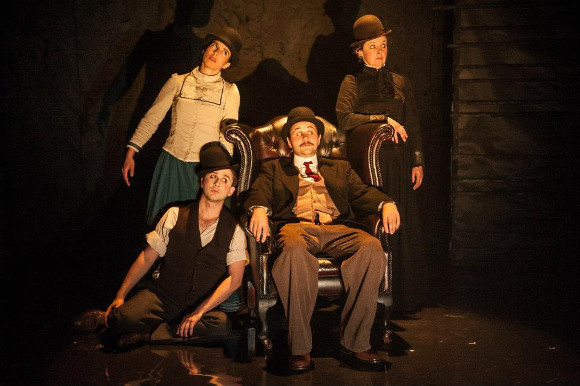The Secret Agent

Stephen Cummiskey
Joseph Conrad's The Secret Agent was unsuccesful on publication and took years to garner its current status as a seminal modernist text. With this adaptation theatre O are hoping to leave similarly divisive early reviews from Edinburgh behind and find a more sympathetic audience in the capital where the action is set. It's an entertaining and mysterious effort but lacks the nuance that made the original text a classic.
Staying quite close to this source material theatre O present the tale of Adolf Verloc (Helena Lymbery) and his role in a plot to blow up the Greenwich Observatory. The audience is taken on a whistlestop tour of London’s known anarchists, with Helena Lymbery giving a show-stealing performance as The Professor, a wild and terrifying explosives expert. The insight into the anarchist cell is initiated by the Russian ambassador Vladimir (Leander Deeny) who is a positively unhinged official looking to inspire fear in the population. The past and fate of Winnie Verloc (Carolina Valdés) and her disabled brother Stevie (Leander Deeny unfolds as the ghastly mission is realised.
The company continue the recent trend of actors doubling as stagehands as they acrobatically and effortlessly shuttle props around the stage for each scene. The physicality of the production is fantastic and matches the simple yet striking sets. The claustrophobic living room in particular is a triumph: a stuffy leather clad parlour where the Verloc family play out their monotonous and mediocre lives. These insular scenes foreground the source material’s emphasis on environmental influence but unfortunately do not go as far as Conrad in establishing an oppressively naturalist London that fosters insanity and anarchy.
Without this sense of place grounding the piece some scenes fluctuate quite drastically in tone. The embassy scene in particular is truly bizarre with fairly lacklustre and at times baffling audience participation that adds little to what eventually becomes a ham-fisted politicised version of the mad hatter’s tea party. It’s a strange scene that foregrounds an almost schizophrenic sense of tone throughout: the audience is never sure if this is a vaudevillian farce, a slapstick comedy, a warped political thriller like Dr Strangelove or a harrowing tale of greed and exploitation.
It’s a committed performance with a pace that keeps the audience entertained and intrigued, but without more coherency or sense of place theatre O are unfortunately trying to blow up a moving target and miss the sharpness of the original.
Patrick Brennan










